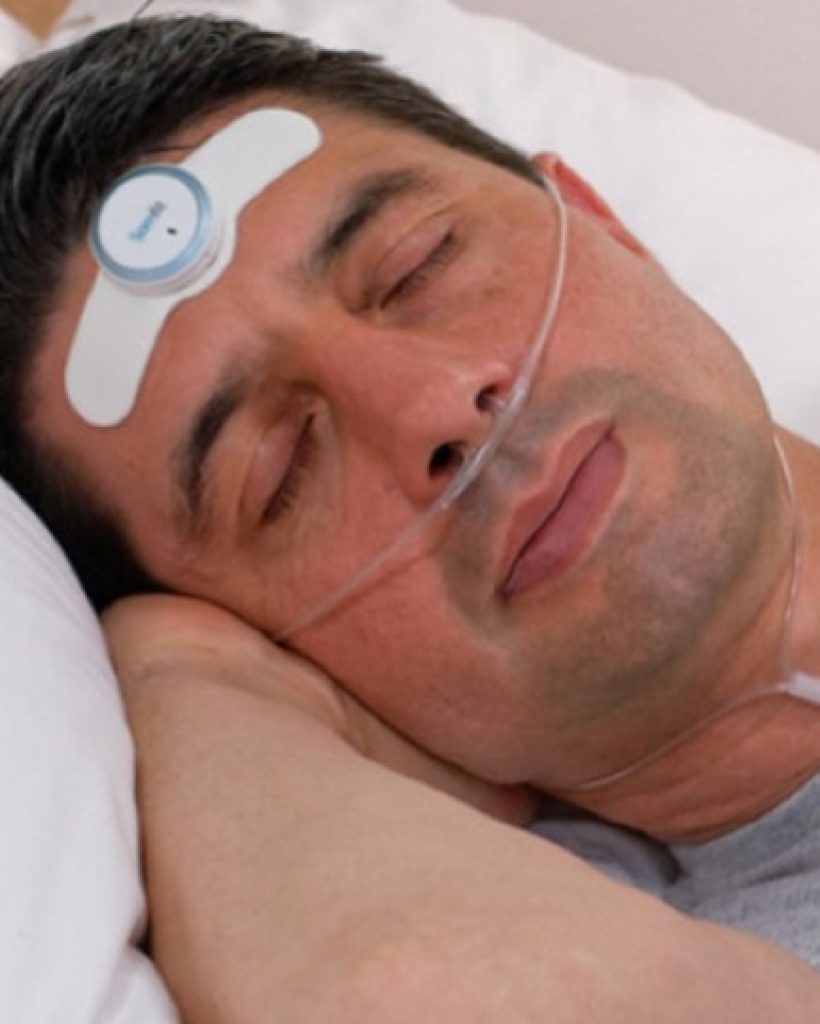A home sleep apnea test is one way to detect obstructive sleep apnea. The test monitors your airflow, oxygen and breathing effort while you sleep at home. Your doctor will perform a complete assessment of your sleep complaints. If you have a high risk of sleep apnea, then your doctor may order a home sleep apnea test for you.
You will receive instructions on how to set up and use the home sleep apnea testing device. There are a variety of different devices, but all of them should monitor at least three signals to detect sleep apnea:
For example, you may wear a sensor under your nose to monitor your breathing.
One or more soft belts typically are placed around your chest to measure your breathing effort.
You will wear a sensor on your finger to monitor the oxygen levels in your blood. This sensor also may be used to estimate your heart rate. Other sensors monitor your body position and snoring.

Call us now to schedule your appointment with New Mexico Sleep Labs. Our expert team is here to help you achieve restful, restorative sleep and improve your overall health. Don’t wait—take the first step towards better sleep today
Follow the instructions to remove the sensors after you wake up. Then you will return the testing device. Your data will be downloaded from the device. A sleep doctor will interpret the data and make a diagnosis. If the results are unclear, the doctor may recommend that you spend a night in a sleep center for a sleep study. If the test shows that you have sleep apnea, then your doctor will discuss treatment options with you and develop a treatment plan.
1. Is the test painful?
No, a home sleep apnea test is not painful. You should be able to sleep fine in your own bed.
2. Is the test the right option for everyone?
Your doctor will determine if a home sleep apnea test is right for you. The test is a good option for many adults who have a high risk of sleep apnea. However, a home sleep apnea test is unable to detect other sleep disorders. The accuracy of the test also can be affected by other medical conditions. Your doctor may decide that a better option for you is to spend the night in a sleep center for a sleep study.
3. Can I get out of bed to go to the bathroom during the test?
Yes, you can get out of bed during the test. Keep all of the sensors connected while you are out of bed.
4. Should I take my nighttime medications?
You should follow your doctor’s instructions. Typically you should take any medications that you normally use at bedtime.
5. Can I sleep in a recliner?
Generally, it is required for you to try to sleep in a bed. Sleeping in an elevated position in a recliner may affect the results of the test.
6. Can I have the television on?
You should turn off the TV prior to bedtime. Otherwise, it might interfere with the sleep recordings and interrupt the home sleep apnea test. You also should turn off your cell phone and any other electronic devices to minimize the chance of sleep disruptions.
7. Do I need to start and stop the recording?
Follow the instructions that come with your device. You may need to start the recording when you go to bed and stop it when you wake up.
8. How will I know the results of the home sleep apnea test?
You will schedule a follow-up appointment with your doctor to discuss the results of the home sleep apnea test.

Facility Member
Since 1977, the American Academy of Sleep Medicine (AASM) Standards for Accreditation have been the gold standard by which the medical community and the public evaluate sleep medicine facilities. Achieving AASM accreditation demonstrates a sleep medicine provider’s commitment to high quality, patient-centered care through adherence to these standards.

At New Mexico Sleep Labs, we are dedicated to diagnosing and treating sleep disorders to help you achieve restful and restorative sleep.
New Mexico Sleep Labs by Bedrock Digital
Copyright © . All rights reserved.